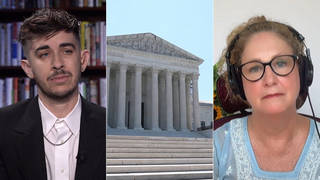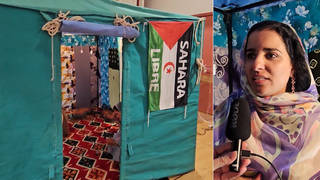
Topics
Guests
- Camila Vallejovice president of the University of Chile Student Federation. From late 2010 through 2011, she was president of the organization and has been a main spokesperson for the national student federation, the Confederation of Chilean Students. Vallejo is also a member of the Central Committee of the Chilean Communist Youth and a geography student at the Universidad de Chile in Santiago. In 2011, she was included in Time magazine’s “100 People Who Mattered” and also named as “Time Person of the Year” in its annual issue, which honored “the protester.” Likewise, readers of The Guardian chose her as their “Person of the Year,” and Chileans elected her “Person of the Year” in their poll. And, in 2012, Newsweek/Daily Beast included Camila Vallejo in its list of “150 Fearless Women.”
- Noam Titelmancurrent president of the Catholic University Student Federation. He is one of the main leaders of the Chilean student protests and was formerly a spokesperson for the Confederation of Chilean Students. Noam Titelman is presently a student in commercial engineering and Spanish literature at the Catholic University of Chile in Santiago.
- Marcial GodoySpanish-English interpreter.
Part two of our conversation with two of Chile’s most recognizable student protest leaders: Camila Vallejo and Noam Titelman. They are in the United States, in part to receive the 2012 Letelier-Moffitt Human Rights Award, which is given by the Institute for Policy Studies. It is named for the Chilean diplomat Orlando Letelier and his colleague Ronni Karpen Moffitt, who were murdered in Washington by agents of the U.S.-backed Pinochet regime in September 1976.
AMY GOODMAN: This is Democracy Now!, democracynow.org, The War and Peace Report. I’m Amy Goodman, with Nermeen Shaikh.
NERMEEN SHAIKH: Two leaders of the Chilean student movement are in the United States this week where they will be awarded the 2012 Letelier-Moffitt Human Rights Award. The prize is named for the Chilean diplomat Orlando Letelier and his colleague Ronni Karpen Moffitt, who were murdered in Washington by agents of the U.S.-backed Chilean dictator General Augusto Pinochet in September 1976.
Over the past year, the Chilean students’ movement has led some of the largest protests in Chile since the days of opposition marches to Pinochet a generation ago. The movement has rallied hundreds of thousands into the streets of Santiago and other major cities to demand greater access to affordable university education, as well as deeper structural changes in Chile. The country has the highest per capita income in the region but also one of the most unequal distributions of wealth.
AMY GOODMAN: Joining us are Noam Titelman, the current president of the Catholic University Student Federation. He’s one of the main leaders of the Chilean student protests, and he’s a student in commercial engineering and Spanish literature at the Catholic University of Chile in Santiago.
We are also joined by Camila Vallejo, vice president of the University of Chile Student Federation. From late 2010 through 2011, she was president of the organization and has been a main spokesperson for the national student federation, the Confederation of Chilean Students. Camila Vallejo is also a member of the Central Committee of the Chilean Communist Youth and a geography student at the University of Chile in Santiago. Her interpreter is Marcial Godoy.
And we welcome you all to Democracy Now!
Camila, you were just talking about what is happening in Chile today and what Orlando Letelier warned. Can you talk about how students have been galvanized and why these protests are so significant? And what end do you see in sight for—what is the goal you have?
CAMILA VALLEJO: [translated] What brings the students together and the many organizations involved in this together is the fact that in Chile education has been turned into a consumer good, a commodity for consumption, and which has created an enormously segmented socio-educational system. And this is what’s brought us together to reclaim education as a basic and fundamental right and as a public good and a social investment rather than individual one.
And we’re also united and struggling to bring a true democracy to Chile. We marched, and we united around education. We had over 80 percent of approval from the general public for what we were doing, and our demands were simply not taken up and channeled through the institutional means, the political institutions that exist, and so there is a crisis really in political representation. And this also brings up our constitution. While Chile has never had a truly democratically generated constitution, the one we have now is the one we inherited and we have from the years of Augusto Pinochet, from the dictatorship, which has many profoundly anti-democratic structures to it.
NERMEEN SHAIKH: Well, I want to turn to a comment made by the Chilean president in the wake of the student protests. Speaking a few months after the protests began from the steps of La Moneda, he said, quote, “We would all like education, healthcare and many other things to be free, but when all is said and done, nothing in life is free. Someone has to pay.” Camila Vallejo, could you comment on the statement of the president?
CAMILA VALLEJO: [translated] As strange as it might seem, we’re in agreement with President Piñera: education needs to be paid for by someone. And we believe that that is a state. And because we’re aware that in order to guarantee free quality public education for everyone in Chile, someone would need to pay for it, we proposed a tax reform, a national tax reform. Currently, large corporations and enterprises pay very little, if any, taxes, and we proposed a plan that would change the tax structure so that this education could be financed and financed by those who have more.
AMY GOODMAN: How do you think you have changed, Noam Titelman, the society in Chile?
NOAM TITELMAN: I think the new struggles, all social struggles today, are defined by two things. One is the very strong presence of the media. Most of the fights take place through the media, which many times try to make it very difficult because they’re owned by the same people who want to maintain things.
And the second thing is that we are fighting to change common sense. It used to be common sense for people that you had to pay for your education, that you have to pay for your health. And I think that the biggest thing that we managed is to denaturalize certain assumptions that everybody took for given and that is not so. For example, free education is not something so outrageous or strange. It happens in many countries around the world. And we think that this was a possibility because we translated our message that made sense to a lot of people. For example, we started talking about debt. And debt is not only something that affects students; it affects whole families and people who felt that their life was almost like slavery to their credit cards.
NERMEEN SHAIKH: Camila Vallejo, you’ve spoken not only about changes that should occur in terms of funding for public education, but also about the quality of the education being dispensed in public universities in Chile. You’ve said, for example, that the role of education should be to tranform society rather than to reproduce it. Could you elaborate a little bit on that and what kinds of changes you’d like to see made in curricula at the university level?
CAMILA VALLEJO: [translated] The case is that neoliberal education is such that it lends itself to reproduce neoliberalism itself. Education has a slant towards individualism, towards individual success, towards—all sort of these cultures have individual achievement that we really want to address and change.
AMY GOODMAN: I wanted to turn to a clip right now of Naomi Klein. Naomi Klein is the author of The Shock Doctrine. Last year during the protests, Democracy Now! spoke with Naomi about her book, The Shock Doctrine: The Rise of Disaster Capitalism, and she commented on the Chilean students’ protests and calls for free university education.
NAOMI KLEIN: They’re saying, “We want a whole other relationship to education.” It’s going to the core of inequality, because they’re saying, “The fact that we have this profound, two-tiered education system is why Chile has become one of the most unequal societies in the world.” And, of course, that has enormous historical resonance, because this was one of the big transformations of the Pinochet dictatorship, was to privatize education and to create, out of the country in Latin America that had the largest and most vibrant middle class, the most unequal society in Latin America.
AMY GOODMAN: Noam Titelman, can you—can you respond to what she was saying about education in Chile?
NOAM TITELMAN: If I understand The Shock Doctrine, basically, what she meant was about the implementation of this educational system during the Pinochet dictatorship.
AMY GOODMAN: And for people who don’t know what happened during Pinochet’s dictatorship.
NOAM TITELMAN: Well, the story is a lot longer. It started with the implementation of a public educational system beginning of the 20th century—beginning with the 20th century, and that was perceived as a very unique phenomenon in Latin America, where a thriving middle class was starting to progress. And this got to a culmination point during the Allende government, where some socialist ideas were being implemented, but uniquely through a democratic state—democratically elected with a parliament, everything according to the books.
And then there was a coup from Pinochet. And when Pinochet did this coup, they were—the people behind him were very influenced by the Chicago School and Milton Friedman and those ideas, such as the shock doctrine. And basically what they said was, they told this lovely story which did not work, which was this idea that if you had enough providers, for-profit providers of education, you would have customers smart enough and capable of changing from one school to another; competition will lower costs and maximize quality.
And what we found out is that this supposed invisible hand of a market can turn into a fist and punch you in the face with—rather easily. And that’s what happened in our country, because we ended up with a system that did not guarantee equality in education for everyone, only to a small elite in the country. We’ve ended up with a huge inequality. And the question is, how are we going to change that?
AMY GOODMAN: Your parents fled when Pinochet rose to power?
NOAM TITELMAN: They fled a little bit before, and—but we couldn’t—we went back to Chile after the formal democracy returned. This was because it was very hard to work and live during that time if you had different ideas from those imposed [inaudible].
AMY GOODMAN: Camila Vallejo, what are your plans now?
CAMILA VALLEJO: [translated] So, my plan is to keep working in the student movement and with other organizations, really working towards changing the character of the Chilean state. We believe that the Chilean state needs to be a state that guarantees rights, rather than a subsidiary state. And it needs to be one that guarantees rights, protects our natural resources.
AMY GOODMAN: Are you linking up with other students around the world—in Greece, in Spain, in the Arab Spring, in the United States, the Occupy movement?
CAMILA VALLEJO: [translated] Yeah, we are linking up with other organizations. My organization is linked to a union of Latin American and Caribbean student organizations, and we are connected and also making connections to Europe and to the rest of the world, because we believe that this struggle is universal, and education should be a right.
NERMEEN SHAIKH: Camila Vallejo, just before we conclude, I’d like to ask you how the American elections, the elections upcoming, will impact Chile, and U.S. involvement in Chile, in general, and how it’s impacted the protests, and what the protesters are demanding.
CAMILA VALLEJO: [translated] So, the United States has been responsible for atrocities in many places in Latin America and elsewhere in the world. Certainly during the period of the dictatorships, the United States was deeply involved in that. And we believe that, for all of these reasons, the United States really needs to stop seeing Latin America and seeing us as its backyard and stop this intervention. And it’s in the hope that the candidates can address this or speak about this directly, and that they’ll call for an end to this interventionism and that they’ll allow Latin American nations to develop in full sovereignty, and that they also hopefully lift the blockade, the economic blockade with Cuba.
AMY GOODMAN: You are a member of the Central Committee of the Chilean Communist Youth. What does that mean?
CAMILA VALLEJO: [translated] So, I find it a great responsibility and sort of a great challenge. The Communist Party in Chile is a hundred years old; the Communist Youth, 80 years old. And we have an untouchable sort of reputation and track record as defenders of democracy. And we today are working towards deepening democracy in Chile, towards changing our constitution. And we have a big role in the social movement. We’re involved in the social movement. And all of these tasks, I assume from my militancy with all the responsibility that they bring with them.
AMY GOODMAN: Well, we want to thank you both very much for being with us.












Media Options